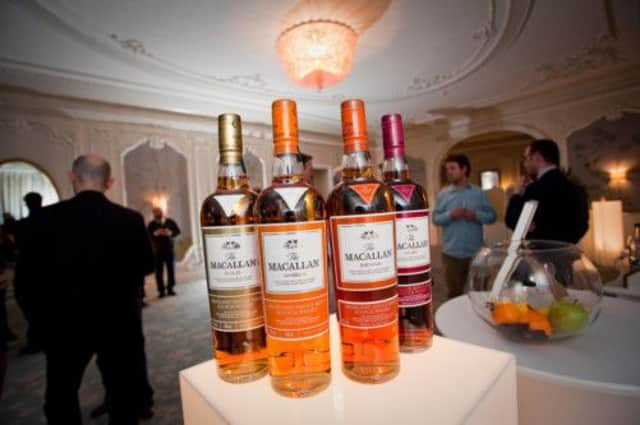Is this the end of the age-declared Scotch whisky?


Now one of the Scotland’s biggest whisky brands has launched a new range marketed by colour – instead of age – allowing it to up production significantly to meet demand.
Macallan has taken the dramatic step of ending the release of its ten, 12, and 15-year-old offerings, which represent much of its 700,000 cases sold every year.
Advertisement
Hide AdNew bottlings in what it calls the 1824 Series – released yesterday – include the Gold, Amber, Sienna and Ruby, reflecting the colour of the whiskies in the range.
Industry figures say by removing the “age statement” on the bottles will allow it to blend casks from different years as distillers face a shortage of stock of a specific age because demand has outstripped the quantity planned to be produced more than a decade ago.
Bob Dalgarno, whisky maker at the Moray distillery, said the move would allow it to take a more “flexible approach” in production.
“Using colour to drive and define a whisky differs dramatically from the conventional age approach, allowing us to explore different casks and take a more flexible approach to our stock”, he said.
“We have been able to work creatively with the full range of matured stock available, rather than working to a predetermined character based on age.
“For me, the key thought in this range is that a great single malt doesn’t need to be 30 years old to taste like a 30-year-old.”
Advertisement
Hide AdMacallan has remained tight-lipped about the ages of each release in the new series, but industry experts said the brand is unlikely to use anything younger than eight-year-old whisky.
Experts explained that, for example, nine and 11-year-old whiskies -– not yet ready for release under the ten and 12-year brands – could now be blended together to produce the “entry-level” Gold whisky immediately.
Advertisement
Hide AdWith the Ruby line – which some believe is based on the high-end 18-year-old Macallan – distillers could use a good quality 17-year-old instead.
Ken Grier, director of malts at Edrington, which owns Macallan, along with Famous Grouse, said: “The 1824 Series has resulted in us being able to use casks when they are ready, as not all whiskies benefit from being left to get older, some mature earlier – much like some people.”
Royal Mile Whiskies, a major supplier in Edinburgh, said many retailers find it difficult to source some brands due to demand.
Arthur Motley, the firm’s purchasing director, said: “The ability to continue to meet demand and ensure quality has become a struggle for many distilleries and there are genuine concerns about whether there will be enough stock in five to ten years time.
“As a result I feel this is one of the most observed whisky launches, as Macallan are a big name and everyone in the industry is waiting to see what happens when it hits the market.”
Mr Motley also warned that the failure to keep up with demand will lead to rising retail prices for consumers.
Advertisement
Hide AdHe said: “Most distillers have put their prices up recently, particularly in the aged stock, including Macallan, Balvenie, a lot of the Glenfiddich range, and many of the Islays such as Laphroaig. As an example, 18 months ago Macallan 18 was £75 and now is around £130.
“There are precedents before of distillers having done this with individual bottles, most notably with Glenmorangie Signet, but not on this scale. No other distillery has tried a complete range without an age statement.”
Advertisement
Hide AdSales fall as taxes rise to make up 80% of cost of a bottle
Scotch Whisky sales have declined by 12 per cent in the UK over the past five years since the introduction of the alcohol duty escalator.
Despite soaring sales in foreign markets, UK volume has dropped from 102 million bottles in 2007 to 90 million in 2012.
At its annual meeting in Edinburgh yesterday, Scotch Whisky Association members discussed the impact of the escalator and the tax burden.
The escalator was introduced in March 2008 by then-chancellor Alistair Darling, with duty being increased by 2 per cent above the rate of inflation each year.
At this year’s Budget, George Osborne removed the escalator for beer and cut duty to help the brewing industry. The SWA is calling for the same move for Scotch, which supports 35,000 UK jobs.
Advertisement
Hide AdTax, including VAT and excise duty, now accounts for 80 per cent of the price of a bottle of whisky.
Chief executive Gavin Hewitt, said: “Scotch Whisky is vital to the UK and Scottish economies. It is time the UK government started treating the industry more fairly. The duty escalator penalises ordinary people at a time of economic pressure, increases the inflation burden, depresses the industry when the government says it wants to stimulate economic growth, and sets an unwelcome tax precedent for other governments.”